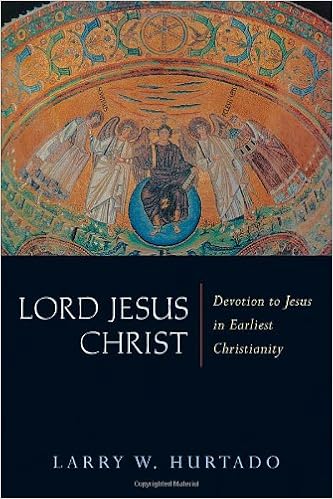JESUS IN BOTH life and memory polarized his listeners.
Today, we move away at last from our discussion around monotheism - Larry Hurtado's first of four factors governing the early emergence of first century "binitarian" Christian worship - and move over to his second factor: Jesus himself. In the previous section, we saw that monotheism provided a constraining influence on the practice of devotion to Jesus, we established some of the contours of what appears to be Hurtado's usage of the word "binitarian" and we questioned the effects and meaning of the inclusion of gentile converts (ex-polytheists). On this last point - just to situate anyone joining us at this point - as an advocate for an early Jewish-Christian form of trinitarian faith, I am asking the question of some of Hurtado's key factors of binitarian devotion: might the Holy Spirit also have been pivotal for such an historic development? More of that in the next post.
Back to Jesus. It might sound like an obvious point, but theologians and historians of Christian origins can do a lot of speculating, postulating and theorising around this or that feature of Christianity and somehow avoid the man himself. I've probably been guilty of that too. Hurtado is not, however, although he will also wisely avoid plunging himself too deeply off-track into appraisals of this or that movement to rediscover what "the historical Jesus" might have required in terms of religious veneration. The material to cover is too vast and the primary point that emerges for his own thesis does not depend on a specific reconstruction, because our author will point to the polarizing effects of Jesus on his followers both during his earthly ministry and in his subsequent memory as resurrected and exalted Lord.
Like Marmite is cleverly promoted through its early image of being a spread British consumers either loved or hated (I love it!), Jesus seems to have thrust a radical choice onto his hearers. Either they accept him as God's messiah of a truly biblical, transformational and inclusive humanity, or you reject him (and repeat, on whatever serious subject matter is necessary). What you don't do, says Hurtado, is adopt some unsubstantiated pacifistic Jesus, who was only made into a polarizing force at some later stage (roughly in this camp: Hurtado tackles Geza Vermes, Burton Mack and, most significantly for me, John Dominic Crossan).
Nonetheless, the bridging mechanism between the polarized Jesus of the church and the polarizing Galilean I felt was not very strongly emphasised by Hurtado in response to authors like Mack: there was likely something in Jesus’ own actions and statements that generated, or at least contributed to, this polarization. In response to Crossan, he is stronger: if [Jesus] intended no special role for himself in their religious life, Jesus would have to be seen as spectacularly unsuccessful in communicating his intentions to his followers. [KL 1088]
Responding to Mack he responds with solid appeals for proof: we do have direct evidence of how Jesus’ sayings were used by a number of Christian circles and none of these circles corresponds to the sort of group that Mack posits. [KL 1134]
Hurtado is referring to an argument from Mack, which appears to be substantially based on "Q", which we will be discussing this in more depth later in the series (and always including the quotes around "Q"). W, Hurtado is loyal to the "Q" hypothesis, which is indeed backed by a majority of scholars writing on the synoptic problem, but intercepts Mack's inferences - since it contains primarily sayings of Jesus and lacks central Christian doctrines on the death, resurrection and ascension of Christ, Mack claims at the very beginning around when "Q" was written those components weren't yet present in the thinking of Jesus' followers.
All of this said, however, it is still curious to note that Hurtado keeps this mental reserve for some gap between what the impact of Jesus and what Jesus' intentions may have been: "in any case, whether in keeping with his intention or not, people were polarized over Jesus" [KL 1091]. We should understand then that what he is tackling is that there can be any scope for a phase during or after Jesus' earthly life in which the primary response to his words and actions was indifference. Not happenin'.
To close, Hurtado summarizes it best: "the immediate and dominant outcome of Jesus’ career was a sharply divided set of views about him, with some so negative as to justify his crucifixion and some so positive as to form the basis of one or more new religious movements" [KL 1162]
Before I sign off, I just wanted to flag that this is the context for the fascinating idea I cited from Hurtado before, right at the start of the series, about dysfunctional or unsuccessful religious mutations. Tracking the christianities that succeeded as mutations from Judaism is, I think, of great interest, especially if we want to claim (like I do) that the Holy Spirit's centrality could not have been a subsequent mutation. With this in mind, and with the glorious benefit of hindsight (!), it is tempting to hold up the mutated triune hub of successful Christianity as the measuring stick of "success" during the first two centuries in particular.
Today, we move away at last from our discussion around monotheism - Larry Hurtado's first of four factors governing the early emergence of first century "binitarian" Christian worship - and move over to his second factor: Jesus himself. In the previous section, we saw that monotheism provided a constraining influence on the practice of devotion to Jesus, we established some of the contours of what appears to be Hurtado's usage of the word "binitarian" and we questioned the effects and meaning of the inclusion of gentile converts (ex-polytheists). On this last point - just to situate anyone joining us at this point - as an advocate for an early Jewish-Christian form of trinitarian faith, I am asking the question of some of Hurtado's key factors of binitarian devotion: might the Holy Spirit also have been pivotal for such an historic development? More of that in the next post.
Back to Jesus. It might sound like an obvious point, but theologians and historians of Christian origins can do a lot of speculating, postulating and theorising around this or that feature of Christianity and somehow avoid the man himself. I've probably been guilty of that too. Hurtado is not, however, although he will also wisely avoid plunging himself too deeply off-track into appraisals of this or that movement to rediscover what "the historical Jesus" might have required in terms of religious veneration. The material to cover is too vast and the primary point that emerges for his own thesis does not depend on a specific reconstruction, because our author will point to the polarizing effects of Jesus on his followers both during his earthly ministry and in his subsequent memory as resurrected and exalted Lord.
Like Marmite is cleverly promoted through its early image of being a spread British consumers either loved or hated (I love it!), Jesus seems to have thrust a radical choice onto his hearers. Either they accept him as God's messiah of a truly biblical, transformational and inclusive humanity, or you reject him (and repeat, on whatever serious subject matter is necessary). What you don't do, says Hurtado, is adopt some unsubstantiated pacifistic Jesus, who was only made into a polarizing force at some later stage (roughly in this camp: Hurtado tackles Geza Vermes, Burton Mack and, most significantly for me, John Dominic Crossan).
Nonetheless, the bridging mechanism between the polarized Jesus of the church and the polarizing Galilean I felt was not very strongly emphasised by Hurtado in response to authors like Mack: there was likely something in Jesus’ own actions and statements that generated, or at least contributed to, this polarization. In response to Crossan, he is stronger: if [Jesus] intended no special role for himself in their religious life, Jesus would have to be seen as spectacularly unsuccessful in communicating his intentions to his followers. [KL 1088]
Responding to Mack he responds with solid appeals for proof: we do have direct evidence of how Jesus’ sayings were used by a number of Christian circles and none of these circles corresponds to the sort of group that Mack posits. [KL 1134]
Hurtado is referring to an argument from Mack, which appears to be substantially based on "Q", which we will be discussing this in more depth later in the series (and always including the quotes around "Q"). W, Hurtado is loyal to the "Q" hypothesis, which is indeed backed by a majority of scholars writing on the synoptic problem, but intercepts Mack's inferences - since it contains primarily sayings of Jesus and lacks central Christian doctrines on the death, resurrection and ascension of Christ, Mack claims at the very beginning around when "Q" was written those components weren't yet present in the thinking of Jesus' followers.
All of this said, however, it is still curious to note that Hurtado keeps this mental reserve for some gap between what the impact of Jesus and what Jesus' intentions may have been: "in any case, whether in keeping with his intention or not, people were polarized over Jesus" [KL 1091]. We should understand then that what he is tackling is that there can be any scope for a phase during or after Jesus' earthly life in which the primary response to his words and actions was indifference. Not happenin'.
To close, Hurtado summarizes it best: "the immediate and dominant outcome of Jesus’ career was a sharply divided set of views about him, with some so negative as to justify his crucifixion and some so positive as to form the basis of one or more new religious movements" [KL 1162]
Before I sign off, I just wanted to flag that this is the context for the fascinating idea I cited from Hurtado before, right at the start of the series, about dysfunctional or unsuccessful religious mutations. Tracking the christianities that succeeded as mutations from Judaism is, I think, of great interest, especially if we want to claim (like I do) that the Holy Spirit's centrality could not have been a subsequent mutation. With this in mind, and with the glorious benefit of hindsight (!), it is tempting to hold up the mutated triune hub of successful Christianity as the measuring stick of "success" during the first two centuries in particular.



No comments:
Post a Comment
Thanks very much for your feedback, really appreciate the interaction.